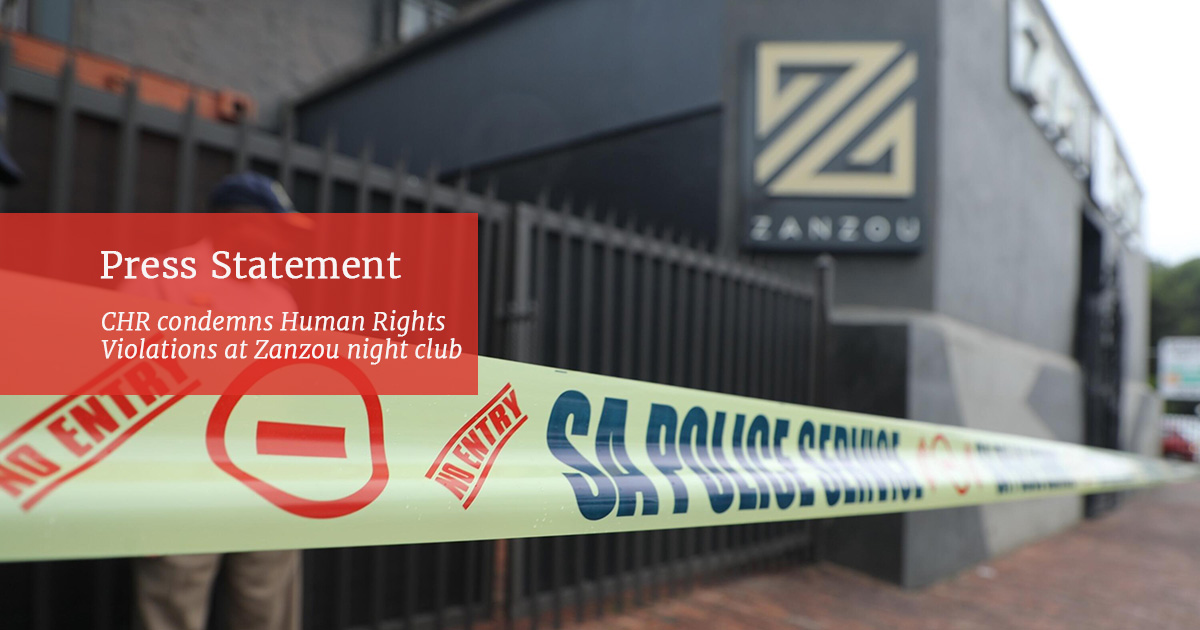FOR IMMEDIATE RELEASE
February 20, 2025
The Centre for Human Rights, Faculty of Law, University of Pretoria condemns the recent violations of human rights, particularly with regard to the right to dignity, privacy and bodily integrity, that occurred at Zanzou Night Club in Pretoria. Reports have surfaced detailing incidents of violence, harassment, and abuse directed toward patrons, which are alarming and unacceptable in any society that values human rights and the rule of law.
The leaked videos showcase extreme violence, torture, sexual abuse and inhumane and degrading treatment allegedly perpetrated by Zanzou’s club bouncers. The highly graphic clips, circulating widely on social media and online platforms, depict severe human rights violations, including acts tantamount to torture, kidnapping, sexual assault, and attempted murder. Several men are seen hogtied, naked, and bound; an alarming display of brutality against patrons who reportedly failed to settle their bills and allegedly stealing phones.
There is absolutely no justification for the acts of torture, inhumane and degrading treatment that were inflicted. Whether the individuals involved had stolen phones or failed to pay their bills, there are clearly legal avenues available for addressing such matters. The actions taken by the bouncers are wholly disproportionate and unlawful, as alternative legal processes could have been used to resolve the situation without resorting to violence and humiliation.
While police investigate various offences linked to these incidents, human rights groups have raised concerns that this is not an isolated case. Rather, it reflects a broader culture of human rights violations in South Africa's nightclub industry, where the right to dignity and bodily integrity is frequently violated. This incident has ignited crucial conversations about what happens behind the scenes in South African society and the unchecked power dynamics within these establishments, often impunity-driven authority wielded by nightclub owners, security personnel, and others in positions of power. The prevalence of such human rights abuses in this sector is indicative of broader societal issues, where those with power can exploit their authority without fear of accountability. The conversation surrounding this incident is crucial in pushing for systemic change, demanding greater oversight, and reinforcing the need to protect the fundamental rights of every individual, especially in public spaces that are meant to offer enjoyment and safety, not harm.
At law, international and regional human rights instruments prohibit torture, inhumane, and degrading treatment, alongside relevant provisions from the South African Constitution. Article 5 of the Universal Declaration of Human Rights (UDHR), and article 7 of the International Covenant on Civil and Political Rights (ICCPR), prohibit torture and provides that ‘‘No one shall be subjected to torture or to cruel, inhuman or degrading treatment or punishment.’’ Article 2 of the Convention Against Torture and Other Cruel, Inhuman or Degrading Treatment or Punishment obligates states to take effective legislative, administrative, judicial, or other measures to prevent acts of torture in any territory under their jurisdiction.
African regional human rights instruments such as Article 5 of the African Charter on Human and Peoples' Rights, provides for the right to dignity inherent in a human being and to the recognition of his legal status. ‘‘All forms of torture and cruel, inhuman or degrading punishment and treatment shall be prohibited.’’ The Protocol to the African Charter on Human and Peoples' Rights on the Rights of Women in Africa among other regional human rights instruments also prohibits all forms of harmful practices against women, including torture and degrading treatment.
The South African Constitution, of 1996 in section 12(1)(d): provides that ‘‘everyone has the right not to be tortured in any way; and section 10: provides that ‘‘everyone has inherent dignity and the right to have their dignity respected and protected. ’These instruments collectively emphasize the global, regional and South Africa’s commitment to prohibiting torture and degrading treatment, reflecting a broad consensus on the importance of upholding human dignity.
The right to dignity and bodily integrity is fundamental to all individuals, irrespective of their background or circumstances. It serves as the cornerstone of our common humanity and is enshrined in the above mentioned international and regional human rights instruments. The actions witnessed at Zanzou Night Club not only infringe upon these rights but also signal a troubling trend of violations of fundamental and basic human rights in South Africa. In light of these grave violations, the Centre for Human Rights urges the South African authorities to conduct a thorough investigation into these incidents and bring those responsible before independent and impartial tribunals to be held accountable in fair trials . It is imperative that effective measures are put in place to prevent future occurrences, ensuring that all individuals can enjoy their rights in safe and respectful environments.
The Centre for Human Rights stands in solidarity with the victims and calls for immediate action to safeguard their dignity and support their healing process. We also call upon civil society, community leaders, and the public to engage in constructive dialogue and action against violence, torture, inhumane and degrading treatment of persons in recreational places, fostering an atmosphere of respect of fundamental human rights.
We must collectively reaffirm our commitment to protecting human rights for everyone, everywhere. The Centre for Human Rights will continue to advocate for accountability and justice for the victims.
For further information, please contact:
Hlengiwe Dube
Project Manager
Expression, Information and Digital Rights Unit
hlengiwe.dube@up.ac.za
Tendai Mbanje
Project Officer
Expression, Information and Digital Rights Unit
mbanje.tendai@up.ac.za
Belinda Matore
Project Officer
Expression, Information and Digital Rights Unit
br.matore@up.ac.za
